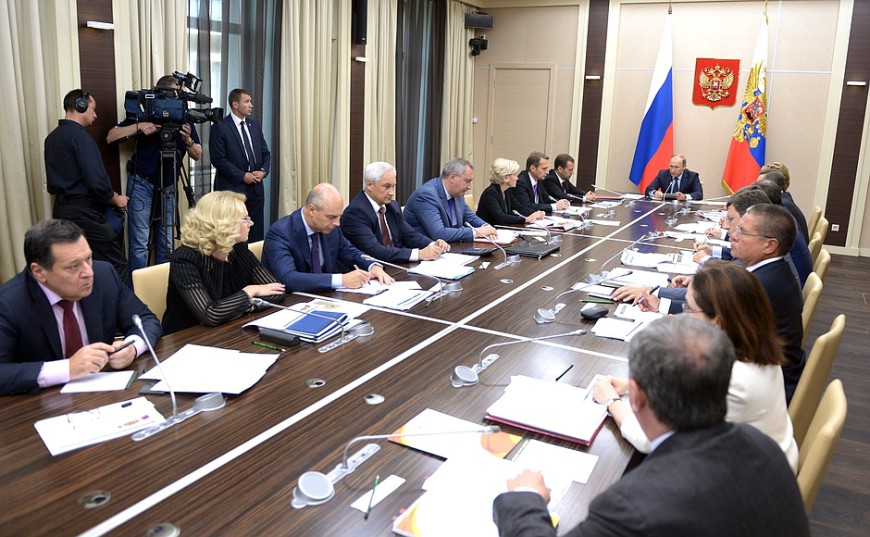
Today, Russian President Vladimir Putin met with his advisors to help the government find a solution to balance the budget, pay pensions and boost tax revenues.
In most countries, neither of these are closely linked to oil prices, but in an energy-dependent export state like Russia, oil prices permeate each and every branch of government.
The group met Putin at his Novo-Ogaryovo residence outside of Moscow, but no major budget decisions were taken.
One especially important issue that wasn’t resolved is what role Russian oil companies may be forced to play in order to mend the budget gap.
Ahead of the meeting, Finance Minister Anton Siluanov put forth a plan to raise taxes on the oil industry that could pump an extra 605 billion rubles ($9 billion) into the 2016 budget. This would only put a dent in the $40 billion, or about 3 percent of GDP, budget deficit expected for 2015.
Already, the Russian government relies on oil and gas export revenues for over half of its budget.
Under discussion is a proposal to raise extraction taxes and export duties on the oil industry, which may generate an additional 605 billion rubles ($9 billion) for next year’s budget.
“I am asking the Cabinet to look into bringing additional revenues into the budget received by our exporters as a result of the ruble’s devaluation. Naturally, we need to tread very carefully, in order not to weaken the economy of export companies, maintaining their investment opportunities,” Putin said at the meeting.
RBC, the Russian business daily, estimates this tax adjustment could cost Russia’s largest oil company Rosneft an additional 200 billion rubles ($3 billion) and Lukoil, the second biggest, 100 billion rubles ($1.5 billion).
This isn’t the first time the oil companies would be helping out the government. In December 2014, just after the ruble crashed and lost more than 30%, five major state exporters, including Gazprom and Rosneft, were ordered to sell a portion of their foreign currency earnings to support the ruble.
Though low oil prices would normally spell disaster for a hydrocarbon-dependent country like Russia, the 50 percent devaluation of the ruble in the last year has saved several Russian oil giants and then some.
With a majority of operation costs in rubles and revenues in dollars, Russia’s energy majors are turning record net profits (in rubles, that is).
Ilya Trunin, director of the tax department at the Ministry of Finance, may have described it best: “[Russian] oilmen must understand- if they want to pay less, they have to pay more.”
Analysts warn the initiative could have a negative effect on the industry, since it would reduce company’s cash flow and subsequently dig into development and investment in new fields and production. While there is no scarcity of oil reserves in Russia, the untapped reserves in the Far East are vital to develop and start drilling before the resources in Western Siberia run dry.
Igor Sechin, the head of Rosneft, was the only businessmen at Tuesday’s meeting with Putin, alongside Central Bank Governor Elvira Nabiullina, Economy Minister Alexei Ulyukayev, Energy Minister Alexander Novak, and several other government officials.
Sechin opposed the finance ministry’s initiative, RBC reported.
Oil prices continue to hover at 6-year lows and are not showing any substantial signs of recovery, as countries continue to produce more oil than the sluggish world economy can absorb.
This has caused the Russian ruble to collapse at a time when the economy was already showing distress, and the world’s 8th biggest economy is now facing its first major recession since 1998.
There is less money for government programs across the board, foreign investment into the country has been swiftly exiting, inflation is in record double digits, and wages across the country are depressed.
Lower oil prices didn’t trigger Russia’s financial problems but certainly exasperate the already fragile situation. If the government can’t summon up money from Rosneft and Lukoil, they will be forced to either peg pensions to inflation or raise the retirement age- both hugely unpopular political moves.
No final budget decisions were made Tuesday, and the group will again meet in late October.
